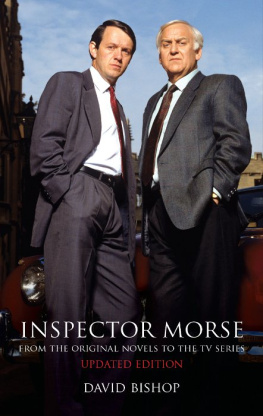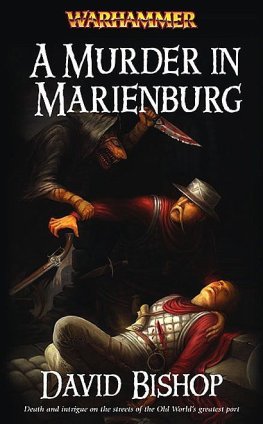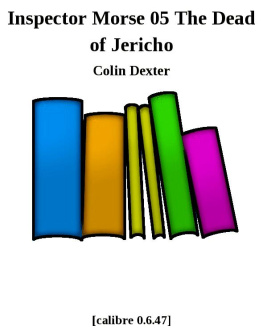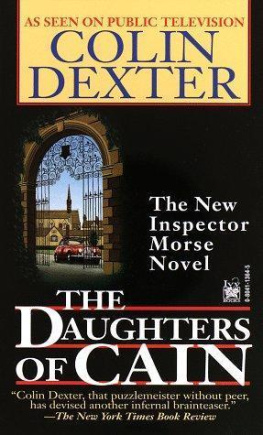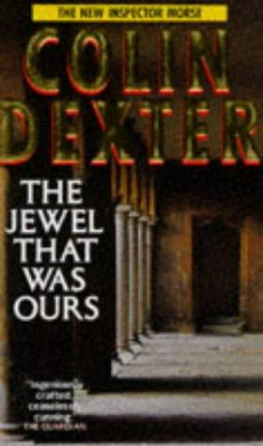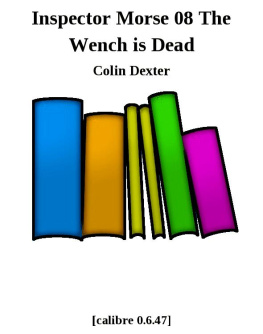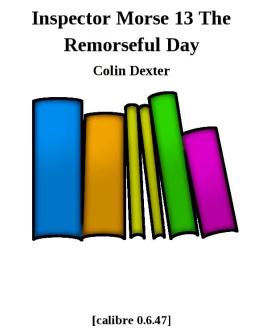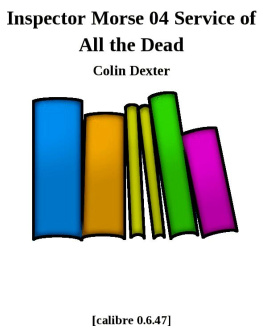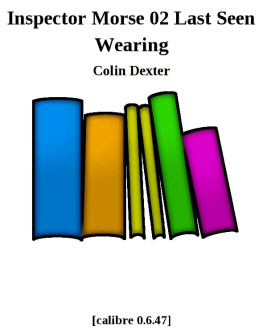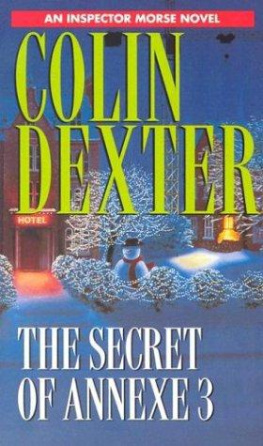
THE COMPLETE
INSPECTOR MORSE
FROM THE ORIGINAL NOVELS TO THE SCREEN
DAVID BISHOP
TITAN BOOKS
The Complete Inspector Morse
ISBN: 9780857689559
Published by
Titan Books
A division of Titan Publishing Group Ltd.
144 Southwark St.
London
SE1 0UP
This edition: October 2011
10 9 8 7 6 5 4 3 2 1
First published in the UK 2002.
The Complete Inspector Morse copyright David Bishop 2002, 2006, 2008, 2009, 2011.
Photographs, including cover ITV/Rex Features.
Did you enjoy this book? We love to hear from our readers. Please e-mail us at: or write to Reader Feedback at the above address.
To receive advance information, news, competitions, and exclusive offers online, please sign up for the Titan newsletter on our website: www.titanbooks.com
No part of this publication may be reproduced, stored in a retrieval system, or transmitted, in any form or by any means without the prior written permission of the publisher, nor be otherwise circulated in any form of binding or cover other than that in which it is published and without a similar condition being imposed on the subsequent purchaser.
A CIP catalogue record for this title is available from the British Library.
Printed and bound in Great Britain by CPI Group UK Ltd.
AUTHORS NOTE
The first edition of this book was commissioned before John Thaws announcement, in June 2001, that he was battling cancer and hoped to make a full recovery. Sadly, he died on 21 February 2002, with his family around him. In the following days the news media were filled with articles praising his work on stage and screen, acknowledging Inspector Morse as his best-known role and arguably his greatest performance. Colin Dexter, the creator of Morse, rightly described Thaws death as a cause of huge sadness.
This new edition is again dedicated to the memory of John Thaw, 1942-2002.
David Bishop
Lanarkshire
ACKNOWLEDGMENTS
Colin Dexter without whom there would be no Morse
John Thaw and Kevin Whately for first firing my interest in Morse
Marcus Hearn and Richard Reynolds for believing in this book
A. Bahbahani for spotting mistakes in the second edition
Alison Bishop for love, patience and understanding
Alan Barnes for Holmesian insights
INTRODUCTION
Inspector Morse is a phenomenon. Created in a series of bestselling novels by retiring Oxford academic Colin Dexter, the character changed the face of British television drama. The grumpy detectives endeavours have been seen by more than a billion people in 200 countries worldwide. That means one in seven people alive on the planet has watched an episode of Inspector Morse.
More surprising still, Morse is an undying phenomenon. Dexter killed off his character in the 1999 novel The Remorseful Day, yet new stories about Morse continue to appear in print. The TV series went off air in 2000, after bringing the characters death to the screen with an adaptation of The Remorseful Day. But all 33 episodes of the show are endlessly repeated round the world.
The world of Morse was never about just the irascible inspector. His longsuffering sergeant Lewis was an integral part of that phenomenal success. In 2006 the character was given his own spin-off TV special. It became the highest rating drama of the year, inevitably leading to a new, returning series. Twenty episodes of Lewis have now been broadcast, finding as great a global audience in this millennium as Morse did in the last.
Dexters creations have even found their way into a new narrative medium. In 2010 a Morse play went on tour around Britain, scripted by screenwriter Alma Cullen and approved by Dexter himself. Colin Baker stepped into the part of Morse, bringing a fresh interpretation to the role made famous by the late, great John Thaw.
Now, nearly 25 years after Morse first appeared on our screens, there are discussions about producing a new television drama showing the character as an undergraduate in Oxford. It remains to be seen whether this project will come to pass, but even the suggestion of such a development was enough to make headlines around the world yet more evidence of the characters undying appeal.
But why does Morse endure, even though the characters been dead for over a decade? What makes this obdurate, irascible, obtuse individual such a source of fascination for millions upon millions of people worldwide?
In truth, it required a happy combination of circumstances.
Dexters novels and short stories were intelligent and highly readable. The character of Morse was unique and appealing, created by an author who wasnt trying to pander to any predetermined notions or market niches. Its worth remembering that two of Dexters novels, Service of All the Dead and The Dead of Jericho, had won Silver Dagger awards from the Crime Writers Association before anyone thought of adapting them for TV.
(Morse novels subsequently won two Gold Daggers and the CWA gave Dexter its coveted Diamond Dagger in 1997 for outstanding services to crime literature. In 2000 he was awarded an OBE in the Queens Birthday Honours List for his services to crime writing. All proof that he was not merely a mid-list author who got lucky.)
But its fair to say that television turned the well-loved chief inspector into a global sensation. Inspector Morse broke all the rules when it first appeared on the small screen in January 1987. At the time, flashy US cop shows like Miami Vice were considered the way forward. The attention span of viewers seemed to be dwindling by the day. Surely nobody would sit still for a two-hour programme about a grumpy old detective with a liking for real ale, crosswords and the operas of Wagner?
History shows how wrong those assumptions were. Inspector Morse won BAFTA (British Academy of Film and Television Arts) awards for best drama on British television. John Thaw received BAFTA best actor awards for his portrayal of Morse. The shows music won BAFTA awards for composer Barrington Pheloung, and albums of music from the series stormed the pop charts and sold hundreds of thousands of copies.
Producer Kenny McBain and executive producer Ted Childs made several wise choices while developing Morse for TV. They abandoned the accepted wisdom that a police drama also had to be a series instead they would make one-off films for TV. They dispensed with the notion of some lowest common denominator deciding what should be broadcast, aiming for an aspirational audience that wanted to be rewarded for its taste and intelligence. They spent time and money making each episode, far more than was usually afforded TV dramas. They decided to shoot on film, giving visuals a cinematic quality.
McBain and Childs wanted the best talents available to work behind the camera, putting particular emphasis on getting the scripts right. Its no coincidence that Morse alumni like Anthony Minghella, Danny Boyle and John Madden all went on to make Oscar-nominated and, in several cases, Oscarwinning films. Employ the best and youll get the best was the motto for the programme and it paid off. The guest actors for each episode read like a Whos Who of Britains best thespians.
The final piece in the jigsaw was casting the central characters. John Thaw was reluctant to play another hard-nosed policeman after spending much of the 1970s in The Sweeney. But Morse was a very different kind of copper, more comfortable with Mozart and mind-bending puzzles than punching villains and pinching thieves. Thaw found the greatest role of his career with the gruff, grumpy, beer-guzzling chief inspector, and he was rewarded with two BAFTA trophies as a result.
Next page
